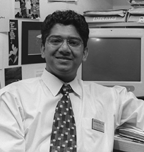 Bringing
care to those in need
Bringing
care to those in need
by Dr.Jeevan Paul, Model Cities HAelth Center in St. Paul, Minn.
with Ryan Miller
As a child, as far back as I can remember, issues about peace and
justice consumed me. As a 10-year-old, living in Princeton, N.J.,
I asked my parents to send my allowance to earthquake victims in
India. At the age of 15, while living in India, I decided I would
be a doctor to serve India's poorer, rural communities.
I once asked my father why Christians tolerate poverty. My father's
reply, "Jesus said the poor would always be with us,"
did not satisfy me. It was not until a decade later, in [Director
of Peace, Justice and Conflict Studies] Ruth Krall's Liberation
Theologies class at Goshen College, that I found a framework that
validated my ideas about Jesus and poverty.
At Goshen, my self-esteem grew when I learned that others shared
my belief that following Christ meant challenging injustice and
poverty. The Latin American Liberation notion that God was on the
side of the poor affirmed my worldview. Liberation Theologies and
Violence/Nonviolence (also taught by Krall) gave me new language
to articulate my feelings and helped create an intellectual foundation
that continues to sustain me today.
It was Ruth who recommended I attend a 1993 conference on health
and healing that focused on patients with life-threatening illnesses.
That information influenced my medical training and current practice.
Eleven years after graduation, I still seek out Ruth for her expertise
on peace, justice and healing.
I currently work as an internal medicine physician at a community
health center in St. Paul, Minn., serving a similar population to
those I wanted to care for in India. Most of my patients earn well
below the poverty line. Racism, poverty and domestic violence intersect
with heart disease, diabetes and chronic lung disease on a daily
basis in my exam rooms. Part of my job as a physician involves helping
patients successfully navigate healthcare systems that too often
treat them according to the color of their skin or the size of their
pocketbooks.
Medical training offers important knowledge about how to treat health
conditions, but provides little education on the larger issues of
peace and justice. In our clinic, my colleagues and I strive to
create a place where each patient is treated as if they come from
the richest neighborhood in the Twin Cities. It means a lot to me
when patients say they like seeing their doctor. While I can't fix
most economic issues, I can provide them with respectful, compassionate
and quality care.
This morning, I missed an important call because I was on the phone
seeking protection for a patient who is a victim of domestic violence.
In spite of my mission or reasons for working at this clinic, I
can't solve her problems. But I can at least get other people involved
who can be helpful to her. Hopefully, for this woman, our clinic
and my office can be a place of trust, comfort and safety.



 Bringing
care to those in need
Bringing
care to those in need